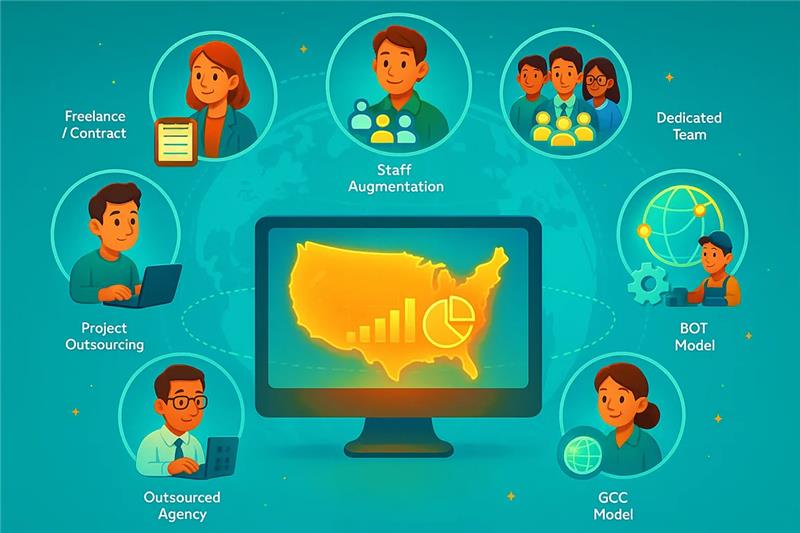In This Blog Post
Share This Article
- Published: Aug 22, 2025
- Last Updated: Aug 29, 2025
- 🔊 Listen
Quick Reads
- Hiring an offshore employee is a forward-thinking solution for CPA firms to address talent shortages and rising operational costs.
- Offshore employees are skilled in U.S. accounting and tax regulations, including preparing tax forms and ensuring GAAP and IRS compliance.
- They are proficient in widely used software like QuickBooks, Xero, and NetSuite, and leverage automation to minimize errors and enhance productivity.
- When choosing a partner, CPA firms should prioritize expertise and credentials (like CPA/CA certifications), robust data security protocols (ISO/IEC 27001, SOC 2), and clear communication to ensure a successful partnership.

Smart Outsourcing for CPAs
Outsource to save time, cut costs, and scale faster.
CPA firms across the U.S. are battling rising labor costs, shrinking margins, and a shortage of qualified talent. The pressure is growing and traditional hiring can’t always keep pace. That’s where offshore staffing steps in.
By tapping into global accounting talent, firms can cut costs by up to 60%, ease workload pressures, and redirect their in-house teams toward higher-value client relationships. What once felt like an unconventional move is now becoming a strategic advantage. In this blog, we’ll unpack how offshore employees are helping CPA firms protect their margins without cutting corners.
How Offshore Employees Help US CPA Firms
CPA firms across the U.S. are leaning on offshore employees to sharpen their edge. The reasons are clear: lower costs, access to global talent, expertise in U.S. tax regulations, and the ability to keep work moving around the clock with advanced technology.
Combined with strategic accounting outsourcing services, firms don’t just cut overheads, they gain scalability, stronger data security, and the freedom to focus on client growth instead of routine tasks. Here’s a closer look at how those advantages stack up.
Cost Savings
Running a U.S.-based accounting team is expensive: salaries, benefits, software, and office overhead quickly pile up. Offshore employees reduce those costs by up to 60%, freeing up capital for client services, tech upgrades, or firm expansion instead of payroll bloat.
Access to a Global Pool of Talent
Offshore teams include a suite of experts like remote bookkeepers, Chartered Accountants, CPAs, and finance professionals with hands-on experience in U.S. tax prep, financial reporting, audits, and compliance. It is one of the smartest ways today for CPA Firms to gain skills on demand to cater to their clients’ growing needs without the struggle of local hiring.
Knowledge of U.S. Accounting and Tax Regulations
Top offshore firms train their teams extensively in U.S. tax laws, GAAP, IRS processes, and state-specific compliance. From preparing forms like 1040, 1065, or 1120 to managing payroll filings and depreciation schedules, offshore employees ensure strict adherence to U.S. regulatory requirements.
Advanced Technology and Infrastructure
Offshore accounting providers bring proficiency in widely used platforms such as QuickBooks, Xero, NetSuite, Zoho Books, and Microsoft Dynamics. Their process-driven approach enhances automation, reduces manual intervention, and minimizes errors. Seamless onboarding and structured workflows ensure smooth collaboration between local and offshore teams.
Round-the-Clock Productivity
The time-zone difference works in their favor. Hand off work at the end of the day and wake up to completed deliverables. During tax season, that 24/7 cycle can mean the difference between meeting deadlines or burning out the in-house staff.
Time Efficiency
Bookkeeping and reconciliations take up too much time. CPA outsourcing services employ dedicated experts to handle those routine tasks, so your team can focus on tax planning, advisory, and building stronger client relationships.
Greater Scalability
CPA firms face fluctuating workloads throughout the year. Offshore staffing for CPA firms offers flexible scaling models, enabling firms to expand capacity during busy periods and scale down when demand eases. This ensures continuity and resource balance without the challenges of constant hiring or downsizing.
Focus on Core Activities
By delegating transactional and compliance tasks such as payroll, sales tax filings, and fixed asset schedules, CPA firms can concentrate on strategic, high-value services. This strengthens client relationships and positions the firm as a trusted advisor rather than just a compliance processor.
Enhanced Data Security
Reputed outsourced accounting services providers prioritize security, complying with ISO 27001, SOC 2, and GDPR standards. They implement encrypted data transfers, secure file-sharing platforms, VPNs, and periodic audits to safeguard sensitive client information throughout the engagement.
Capacity Building
Outsourcing doesn’t just add manpower; it enhances a firm’s ability to expand service offerings. Offshore employees can support specialized functions like forensic accounting, advanced analytics, or niche tax filings, helping CPA firms diversify capabilities without additional overhead.

What Services Does Offshore Employees Handle for CPA Firms?
Outsourcing to offshore employees allows CPA firms to delegate their routine but essential functions. From bookkeeping and payroll to receivables, payables, and tax compliance, offshore staff provide reliable support. They also strengthen financial analysis, forecasting, and audit processes. Here’s more on the services they cover in detail.
Bookkeeping
Offshore teams record day-to-day financial transactions, categorize expenses, and reconcile accounts. They use accounting software to keep ledgers accurate and up to date, ensuring CPA firms always have reliable financial data to support reporting and client advisory work.
Accounts Receivable
They manage invoicing, track outstanding payments, and follow up with clients’ customers to collect dues. Offshore employees also generate ageing reports and maintain cash flow records, giving CPA firms better visibility into client receivables and reducing the risk of delayed collections.
Accounts Payable
Offshore employees process vendor bills, manage approvals, and schedule timely payments. They reconcile supplier statements and maintain proper documentation, ensuring accuracy and compliance. This helps CPA firms streamline payables while avoiding penalties or late payment issues for their clients.
Payroll Processing
Offshore payroll staff calculate wages, process timesheets, and handle statutory deductions such as Social Security, Medicare, and federal or state taxes. They also prepare payslips, generate detailed reports, and take care of filings for forms like 941, W-2, W-3, and state returns. With this support, CPA firms can deliver accurate, compliant payroll services every cycle with efficiency
Financial Reporting and Analysis
Offshore employees prepare financial statements such as the balance sheet, profit and loss statement, and cash flow statement in compliance with the US GAAP standard.
They also create custom reports highlighting trends, variances, and performance insights, giving CPA firms accurate tools to guide their clients’ financial decision-making.
Tax Preparation and Compliance
They assist with compiling client financial data, preparing tax returns, and ensuring compliance with the IRS by handling forms such as 1040, 1065, 1120, and state-specific filings.
CPA firms that hire offshore accountants gain dedicated tax support teams to help reduce workload during peak season and ensure accuracy in filing, minimizing audit risks or penalties.
Budgeting and Forecasting
Offshore staff help CPA firms set up client budgets, compare actuals against forecasts, and generate variance analysis reports. They use various financial models for cash flow forecasting and expense projections, enabling firms to provide clients with clear financial planning and control.
Audit Support
They gather financial records, reconcile accounts, and prepare audit schedules as per auditor requirements. Offshore employees handle documentation requests and perform initial reviews, reducing the time CPA firms spend on audit preparation while ensuring accuracy and completeness of client records.
Offshore Hiring Models: Which One Fits Your US Businesses?
From freelance or contract-based hiring to project-based outsourcing, staff augmentation, BOT models, GCC setups, and outsourced agencies offshore hiring comes in many forms. The key is knowing which approach fits your US business goals best. Here are the details.

Freelance or Contract Based Hiring
This model involves hiring independent professionals from platforms such as Up Work, Indeed, and Glassdoor on a short-term or contract basis. It’s best for specific tasks or roles where flexibility and cost-efficiency matter. US businesses benefit by accessing skilled talent without long-term commitments, though managing quality and consistency may require extra oversight.
Project-Based Outsourcing
In this model, an external offshore accountant manages an entire project end-to-end. It works well for defined projects with clear deliverables and deadlines. US businesses can reduce costs and focus on core operations, but success depends heavily on precise project scoping and effective communication.
Staff Augmentation
Staff augmentation lets you add offshore talent directly into your existing in-house team. The offshore professionals work under your management, giving you control while expanding capacity. For US businesses, it’s ideal for scaling quickly without the burden of recruitment, infrastructure, or long-term hiring risks.
Dedicated Development Team
This model assigns a full offshore team exclusively to your business. They function as an extension of your in-house staff, aligned with your goals and processes. It suits US companies needing continuous, specialized support while maintaining strong collaboration and control over long-term projects.
Build-Operate-Transfer (BOT) Model
In the BOT model, a vendor sets up and manages an offshore operation on your behalf, handling recruitment, infrastructure, and processes. Once stable, ownership is transferred to you. US businesses often use this when planning long-term offshore operations but want to avoid initial setup hassles.
Global Capability Center (GCC) Model
A GCC involves establishing your own offshore unit that handles critical business functions, such as finance, IT, or R&D. It provides full control, intellectual property security, and scalability. For US businesses with large-scale needs, GCCs offer strategic value but demand higher investment and commitment.
Outsourced Agency
Here, US businesses partner with an offshore accounting firm that manages specific functions such as accounting, marketing, or IT. The agency provides its own workforce, processes, and expertise. It’s ideal for companies seeking efficiency and reliable results without investing in recruitment, training, or infrastructure overseas.
How to Choose the Right CPA Outsourcing Partner?
For CPA firms, choosing the right CPA outsourcing services partner starts with getting the fundamentals right, defining your needs, evaluating expertise and credentials, and ensuring strong data security and compliance. It also means assessing communication and reporting practices and reviewing cost transparency to find the best fit. Here’s more on how to choose the right one:
Define Your Needs
- Scope of Work – Decide if you need bookkeeping, accounts payable or receivable, payroll, financial reporting, tax prep, or full F&A support.
- Industry Fit – Some providers specialize in e-commerce, real estate, healthcare, etc. Shortlist partners with experience in your sector.
- Technology – Check if they support your preferred software like QuickBooks, Xero, NetSuite, Zoho Books, and MS Dynamics.
Evaluate Expertise and Credentials
- Qualified Staff- Look for Certified Public Accountants (CPAs), Chartered Accountants (CAs), or equivalent qualifications.
- Experience with Global Standards – Ensure they are familiar with US GAAP, IRS, and local compliance requirements if you operate internationally.
- Case Studies or References – Ask for examples of similar clients they have served.
Check Data Security & Compliance
- Security Measures: Confirm they follow ISO/IEC 27001, GDPR, SOC 2, or HIPAA (if healthcare-related).
- Access Controls: Multi-factor authentication, encrypted file transfers, and secure cloud infrastructure are must-haves.
- Audit Trails: Transparency in data handling builds trust.
Consider Communication and Reporting
- Point of Contact – Ensure you will have a dedicated account manager.
- Reporting Cadence – Weekly or monthly financial reports with dashboards should be standard.
- Cultural or Language Fit – Verify whether they use Zoom, Google Meet, Slack, or Microsoft Teams to ensure smooth communication.
Compare Cost Transparency
- Pricing Models – Hourly, full-time equivalent (FTE), or project-based pricing.
- Hidden Charges – Ask about software fees, setup costs, or overtime rates.
- Value vs. Price – Cheaper isn’t always better; weigh savings against expertise and reliability.
CPA Outsourcing Services: A Smarter Growth Path for U.S. Firms
Still relying only on in-house staff may hold your business back from achieving greater efficiency and growth. Outsourcing gives you access to specialized expertise, advanced technology, and cost-effective solutions while allowing your internal team to focus on what matters most. By combining in-house strengths with the right outsourcing support, you can streamline processes, minimize risks, and strengthen competitiveness.
At Whiz Consulting, we offer customized CPA outsourcing services designed to fit seamlessly with your firm’s operations and objectives. Our team handles everything from bookkeeping, payroll, accounts payable and receivable, internal audits, to tax support ensuring accuracy and compliance at every step. Partnering with us means reducing costs, expanding capacity, and scaling your business with greater confidence.

Get customized plan that supports your growth
Have questions in mind? Find answers here...
You can choose either. Offshore employees can be hired on a full-time or part-time basis, depending on your firm’s needs.
The cost varies based on the role, experience level, and location, but generally offshore employees are significantly more cost-effective than hiring in-house staff in the U.S.
Yes, most offshore teams adjust to U.S. time zones to match your business hours and ensure smooth communication.
Yes, offshore staffing is flexible, allowing you to add or reduce team members as your firm’s requirements change.
It can help fill the gap by providing access to skilled professionals abroad, ensuring work continues without disruption.
CPA firms outsource to India because of the large pool of qualified accountants, cost savings, English proficiency, and experience in U.S. accounting standards.
Thousands of business owners trust Whiz to manage their account
Let us take care of your books and make this financial year a good one.





